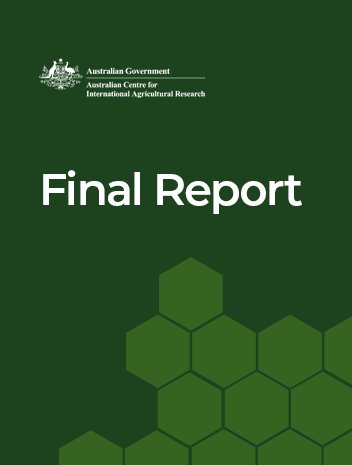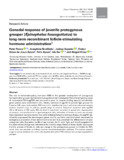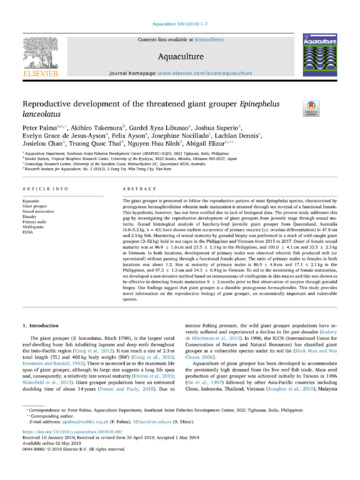Developing technologies for giant grouper (Epinephelus lanceolatus) aquaculture in Vietnam, the Philippines and Australia

Associated URL
www.aciar.gov.auកាលបរិច្ឆេទ
2021-06-29អ្នកនិពន្ធ
Page views
343ទិន្នន័យមេតា
មើលកំណត់ត្រាលម្អិតនៃធាតុ
Share
អរូបី
This project established a sustainable aquaculture industry for giant grouper in Vietnam and the Philippines through the development of captive breeding and larval-rearing techniques.
Captive breeding innovations and larval-rearing techniques, developed through a collaborative Fisheries project, are sustaining the aquaculture industry for giant grouper in Vietnam and the Philippines.
Groupers are vital to the live reef food-fish trade in South-East Asia, and the giant grouper is a high-value, fast-growing species with significant aquaculture potential.
Establishing a sustainable giant grouper aquaculture industry is a high priority for the region, but research is hampered by the high level of investment required to hold and maintain giant grouper broodstock. Lack of commercial production is also due to limited knowledge about the giant grouper’s maturation and spawning behaviour, and low larval survival.
Suggested Citation
Nocillado, J., Elizur, A., Palma, P., Dennis, L., Ninh, N. H., de Jesus-Ayson, E. G., In, V. V., Thai, T. Q., Anderson, K., Luu, T. H. G., Knibb, W., Knuckey, R., Canépa, M., & Bright, D. (2021). Developing technologies for giant grouper (Epinephelus lanceolatus) aquaculture in Vietnam, the Philippines and Australia (p. 71) [Final report]. Canberra, Australia: Australian Centre for International Agricultural Research.
ប្រធានបទ
grouper culture  ; sustainable aquaculture
; sustainable aquaculture  ; breeding
; breeding  ; sex reversal; spawning
; sex reversal; spawning  ; sterility; cryopreservation
; sterility; cryopreservation  ; sexual maturity
; sexual maturity  ; feeding
; feeding  ; stable isotopes
; stable isotopes  ; hybridization
; hybridization  ; biotechnology
; biotechnology  ; gametes
; gametes  ; sex ratio
; sex ratio  ; dna barcoding
; dna barcoding  ; breeding stock
; breeding stock  ; groupers
; groupers  ; Epinephelus lanceolatus
; Epinephelus lanceolatus  ; Viet Nam
; Viet Nam  ; Philippines
; Philippines  ; Australia
; Australia  ; transcriptome
; transcriptome  ; Việt Nam
; Việt Nam  ; Philippines
; Philippines  ; Australia
; Australia 
 ; sustainable aquaculture
; sustainable aquaculture  ; breeding
; breeding  ; sex reversal; spawning
; sex reversal; spawning  ; sterility; cryopreservation
; sterility; cryopreservation  ; sexual maturity
; sexual maturity  ; feeding
; feeding  ; stable isotopes
; stable isotopes  ; hybridization
; hybridization  ; biotechnology
; biotechnology  ; gametes
; gametes  ; sex ratio
; sex ratio  ; dna barcoding
; dna barcoding  ; breeding stock
; breeding stock  ; groupers
; groupers  ; Epinephelus lanceolatus
; Epinephelus lanceolatus  ; Viet Nam
; Viet Nam  ; Philippines
; Philippines  ; Australia
; Australia  ; transcriptome
; transcriptome  ; Việt Nam
; Việt Nam  ; Philippines
; Philippines  ; Australia
; Australia 
Taxonomic term
បណ្តុំបណ្តុំ
Related items
Showing items related by title, author, creator and subject.
-
Quantitative trait Locus Mapping of Growth‐related Traits in Inter‐specific F1 Hybrid Grouper (Epinephelus fuscoguttatus x E. lanceolatus) in a tropical climate
Kubota, Satoshi; Longloy, Amphai; Singhabun, Arkom; Khammee, Wanpen; Kessuwan, Kanonkporn; Bunlipatanon, Paiboon; Ozaki, Akiyuki; Silapajarn, Kom; Tanasomwang, Varin; Okamoto, Nobuaki; Sakamoto, Takashi (Wiley, 2017)Growth‐related traits are the main target of genetic breeding programmes in grouper aquaculture. We constructed genetic linkage maps for tiger grouper (Epinephelus fuscoguttatus) and giant grouper (E. lanceolatus) using ... -
Gonadal response of juvenile protogynous grouper (Epinephelus fuscoguttatus) to long term recombinant follicle-stimulating hormone administration
Palma, Peter; Nocillado, Josephine; Superio, Joshua; Ayson, Evelyn Grace de Jesus; Ayson, Felix; Bar, Ido; Elizur, Abigail (Oxford University Press, 2019-03)The role of follicle stimulating hormone (FSH) in the gonadal development of protogynous hermaphroditic grouper (E. fuscoguttatus) was investigated. Recombinant giant grouper (E. lanceolatus) FSH (rggFSH) was produced in ... -
Reproductive development of the threatened giant grouper Epinephelus lanceolatus
Palma, Peter; Takemura, Akihiro; Libunao, Gardel Xyza; Superio, Joshua; de Jesus-Ayson, Evelyn Grace; Ayson, Felix; Nocillado, Josephine; Dennis, Lachlan; Chan, Josielou; Thai, Truong Quoc; Ninh, Nguyen Huu; Elizur, Abigail (Elsevier, 2019-05-02)The giant grouper is presumed to follow the reproductive pattern of most Epinephelus species, characterized by protogynous hermaphroditism wherein male maturation is attained through sex reversal of a functional female. ...




